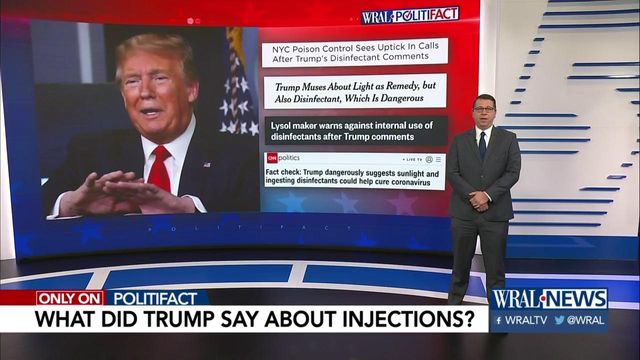Fact check: What did Trump say about disinfectant, injections and COVID-19?
President Donald Trump is walking back what he said during an April 23 coronavirus press briefing about using disinfectants to treat COVID-19 patients. What did he actually say?
Posted — UpdatedPresident Donald Trump is walking back what he said during an April 23 coronavirus press briefing about using disinfectants to treat COVID-19 patients.
"I was asking a very sarcastic question to the reporters in the room about disinfectant on the inside," he said during a briefing in the Oval Office on April 24. "But it does kill it, and it would kill it on the hands, and that would make things much better. That was done in the form of a sarcastic question to the reporters."
The president first posed the question April 23 after William Bryan, undersecretary for science and technology at the Department of Homeland Security, presented a study that found sun exposure and cleaning agents like bleach have an adverse effect on the coronavirus. Bryan was referring to the use of disinfectants on surfaces and in aerosols, but Trump asked whether the chemicals could be used in a potential COVID-19 treatment, as well.
Some websites and social media users took that question to mean the president was recommending people inject themselves with bleach or isopropyl alcohol, an ingredient in hand sanitizer. But others said Trump meant something very different — that doctors could investigate whether using sunlight or disinfectants could clear the virus in patients.
Regardless, Trump’s remarks caused some companies and state agencies to issue warnings about ingesting disinfectants. The maker of Lysol said in a statement that "under no circumstance" should its products be used in the human body.
Given the confusion over what Trump said during the briefing, we wanted to check the transcript to get the full context.
What Trump said about disinfectants
After Bryan’s presentation, Trump floated the idea of using disinfectants to treat COVID-19 patients. He did not say Americans should ingest chemicals to prevent or treat the virus.
Here’s the full context:
Later, Trump clarified his comments after a reporter asked Bryan whether disinfectants could actually be injected into COVID-19 patients.
It’s not clear what part of that discussion he was characterizing as a "sarcastic question" to reporters.
What Trump said about sunlight
Bryan said the DHS study found that sunlight has an adverse effect on the coronavirus. So Trump asked whether there was some way to use sunlight in COVID-19 patients.
But as with his comments on disinfectants, the president stopped short of saying sunlight can cure the coronavirus. Here’s the full context:
Dr. Deborah Birx: "Not as a treatment. I mean, certainly fever is a good thing. When you have a fever, it helps your body respond. But, I’ve not seen heat or light as a —"
Related Topics
Copyright 2024 Politifact. All rights reserved.





